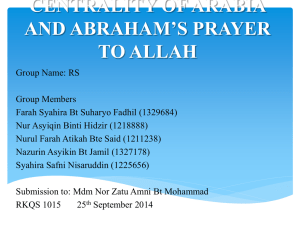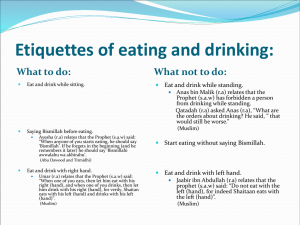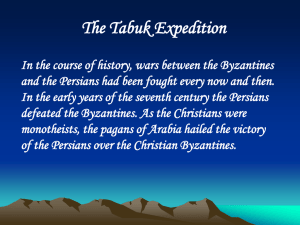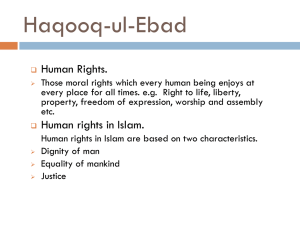Grade 11 Gazwat Tabook
advertisement
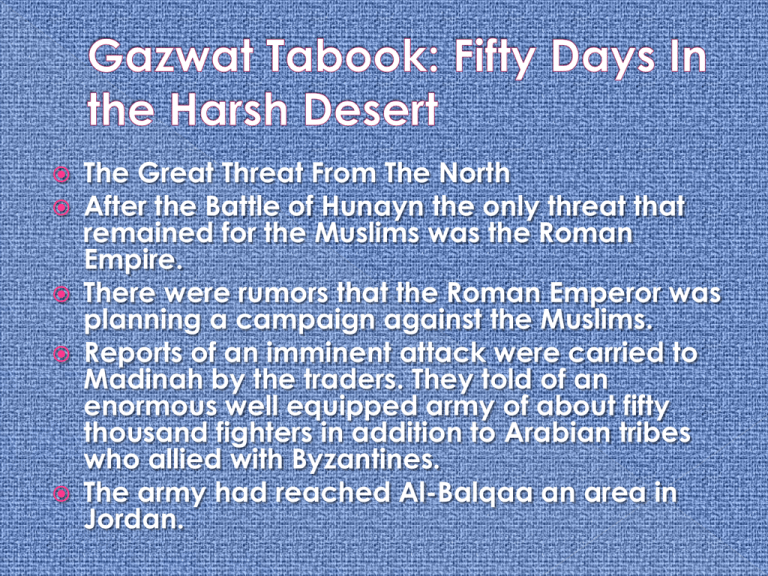
The Great Threat From The North After the Battle of Hunayn the only threat that remained for the Muslims was the Roman Empire. There were rumors that the Roman Emperor was planning a campaign against the Muslims. Reports of an imminent attack were carried to Madinah by the traders. They told of an enormous well equipped army of about fifty thousand fighters in addition to Arabian tribes who allied with Byzantines. The army had reached Al-Balqaa an area in Jordan. The news from Syria brought back memories of the experience of Gazwat Mu’tah that you have learned earlier. In that battle, the Romans and their Arab allies in Syria assembled around two hundred thousand fighters. Zaid Ibn Al-Harithah and other Muslim leaders were martyered during that battle were not forgotten. Prophet Muhammad didn't want take any chances, so he began assembling his largest army ever. He was worried that the Byzantines with their huge army may attack Madinah. The Prophet was determined to proceed up north to face the Byzantines and fight a decisive battle at their own borders. The battle of Tabook was the last of the Prophet’s military expeditions. It was summer, and the blazing desert heat was enough to discourage anyone from traveling. It was the month of Rajab ninth year of Hijrah. Wealthy Muslims contributed large amounts of money for the army fund. Uthman ibn Affan donated enough money to equip ten thousand troops. The army was thirty thousand men strong with ten thousand horses. The Prophet encouraged the Sahabah to pay the charity and fundraise for this Gazwah battle.Uthman ibn Affan donated nine hundred saddled camels, a hundred horses, two hundred ounces of gold as charity, a thousand dinars. The Messenger of Allah looked at them and said: “From this day on nothing will harm ‘Uthman regardless of what he does.” Abdur-Rahman Ibn Awf also gave 2 hundred silver ounces. Abu Bakr gave all his money to the campaign and left nothing for his family the Prophet asked him, What he had left for his family? He answered , “I left for them Allah and his Prophet.” Omar donated half of his fortune. Al-Abbas gifted a lot of money too. Asim ibn Adi offered ninety camel loads. One person gave a bushel or half bushel that he owned. Women contributed by giving jewelry and other items they owned. Despite such generosity, the army still fell short of being perfectly equipped. There remained a shortage of money, equipment, and mounts. Eighteen men had to take turns, sharing one camel. That’s why army was called “The army of Hardship” or “Jaysh-ul-Usrah.” The Prophet set up his camp, at Thaniyyat el-Wadaa. The people of Madinah were witnesses to the stunning scene of the Prophet at the head of his huge army of 10,000 horsemen and 20,000 other soldiers on camelback and foot. It was the habit of the Prophet not to disclose where he was going for Ghzwah, The Prophet specified that he was going to Tabook because of the great distance and long duration of the trip. He wanted everyone to prepare emotionally and physically for this long and difficult journey. The Prophet appointed Muhammad ibn Maslamah Al-Ansari the Amir over the city of Madinah during his absence. This was the greatest Muslim army ever assembled during the lifetime of the Prophet. The thirty thousand strong Muslim army marched to Syria under the scorching Arabian sun. Despite the hardship, the hearts of the Muslims were filled with the love and dedication to the service of Allah and His Messenger. The munafiqeen, or the hypocrites this time tried to scare the believers away from fighting the Romans. They warned them “do you really believe that fighting those people is as easy as fighting a few Arab? By God, we can see that tomorrow you will be dragged in chains.” They also said to the Muslims, “do not travel in the heat.” To which Allah replied in the Qur’an: “the fire of Hell is stronger in heat.” Many of them came to the Prophet making excuses to avoid traveling with him. The prophet knew that they were liars and hypocrites, so he kept tolerating them, hoping that Allah would guide them to the straight path. However, a number of the hypocrites joined the Muslim army for evil purposes, as you learn later. In the north Arabia, the army passed by the ruins of Thamood, the people of prophet Salih, at the village of Al-Hijr. The place is called now Mada, in the northwestern part of present Saudi Arabia. Allah destroyed Thamood because the people disobeyed Allah and His Messenger prophet Salih.When the army was near that place, Prophet Muhammad asked his followers to hurry up while passing through the area. He also prevented them from drinking, eating or making ablution from the wells in that place. Imam Al – Bukhari and Muslim reported that the Prophet Said : “don’t enter upon those punished people unless you are crying as I fear that you may be hit with what they were inflicted with.”And he covered his head with his cloak and accelerated his stride. Halfway between Madinah and Jerusalam,the army set up camp at a place called Tabook in present day Saudi Arabia. The army Remained in Tabook for twenty days, searching for information about the advance of the roman army. The enemy army never showed up. The Romans had their spies and were informed of the Prophet’s preparation for war and knew he had come for them . The Byzantines and their allies were terrified. The Romans quickly retreated to their own frontiers and they scattered. It seems that they had recalled their experience in mu’tah and realized that they would not be able to defeat the huge Muslim army. The Prophet had no desire to invade Syria and confront its army, but he prepared for both possibilities: war and peace. The Muslims gained an awesome military reputation in lands of the Arabian Peninsula. This reputation was far better than military confrontation. The Arab tribes, who allied themselves with the Byzantines, became quite certain that their dependence on their former masters had come to an end. They realized that the Muslims had become more powerful than ever, and that they had better come to terms with them before it was too late. So they became pro-Muslim ,and the Islamic state was able to expand its borders out to the Byzantine borders. Prophet Muhammad realized that the mission was accomplished. He could disperse the great threat of the huge Roman army and their Arab allies. He also made his enemies realized that they could not defeat the Muslims easily. After he had achieved all of the above, the Prophet decided to travel back to Madinah. Before he returned to Madinah, the Prophet called some of the tribes to Islam and established alliances with friendly tribes in the area. Some of the Munafiqeen tried to kill the Prophet during the journey. They thought they could seize the opportunity when the Prophet was on his camel near the edge of a cliff. They attempted to cause him to fall off that cliff, but Allah warned His prophet about The Prophet was guarded by Ammar ibn Yaser and Huthayfah ibn-ul-Yaman who struck the heads of the attackers, camels causing them to flee. Ammar and Huthayfah managed to protect the Prophet and recognized the masked men. So,they asked the Prophet for permission to capture and kill those wicked culprits. The Prophet refused and said, I don’t want the Arabs to think that I kill my companions. 1. Ibn Ishaq said: “the people woke up with no water and complained to the Prophet. He implored Allah, who sent a cloud that rained on them until they quenched their thirst and they took with them their supply of water.” 2. When the Prophet was on his way he lost his she-camel. Zaid Ibn Al-Luseet,a hypocrite,said,Muhammad claims that he is a Prophet and informs you about the news of Heaven, and yet he does not know where his she-camel is.? Then The Prophet said: “there is man saying so and so…By Allah I know only What Allah has taught me; and He informed me that she is in the Valley entrapped in her tether by a tree trunk. Go and fetch her.” They went and found her in the valley as the Prophet described. 3.Imam Muslim reported that before the Prophet had dismounted in a place where the water was scarce, he told his followers that by grace of Allah the next day they would pass by Tabook spring. He warned them not to touch it before his arrival. Two men had arrived before him and touched the water and it became just a thin trickle. The Prophet scolded the two men for not listening to him. Then his companions gathered what little water was left and gave it to the Prophet. He washed his hand and face then he poured the water back to the spring making Du’aa’.The Spring gushed with water. And he told them:” Whoever lives of you will hear that this valley will be most fertile.” On the road, the camel of Abu-Tharr Al-Ghifari slowed him down. He placed his belonging on his back and followed in the footsteps of the Prophet on foot. A while later the Prophet stopped to rest for a while. Someone looked around and glimpsed a man walking from afar and exclaimed: “ O Prophet! There is a man coming alone.” The Prophet said: “let him be Abu-tharr.” When the people looked hard they shouted: O Prophet! By God, he is Abu-Tharr.” The Prophet said : “Allah, have mercy on Abu-tharr. He walks alone, he dies alone, and he will be resurrected alone. Abu-tharr was a leader in his tribe Ghifar and had embraced Islam early on in Makkah. He called his tribe to Islam and many had become Muslim. Prophet Muhammad loved him for his truthfulness, clean heart and diligence. One time , Abu-tharr asked the Prophet to appoint him as an amir, or a leader. The Prophet declined and told him that it was a big responsibility and a trust that he could handle. Abu-Tharr accepted what the Prophet told him and never asked again. He continued to be sincere and faithful follower of the Prophet as this story illustrates. The Prophet stayed twenty days in the area of Tabook,then he headed back to Madinah. The Muslim arrived in Madinah during the month of Ramadan after a long trip that had lasted for fifty days. The Prophet and the Muslim prayed Salat-ulMusafir, or the Traveler;s prayer, during the campaign to Tabook. The Prophet combined Thuhr and Asr prayers during the time of Thuhr.This is called Jami’Taqdeem, or advanced combination. A Muslim can also pray the same tow combination of prayers during the time of the later one. This called Jami’Ta’kheer, or delayed combination. The Prophet also shortened the four-rakaat prayers to two rakaat during travel. The shortening of the prayer is called Qasr in Arabic. When and where did the campaign to Tabook take place? Why did the Prophet advance toward Syria? Describe the military powers of the Muslims and the enemies during the military campaign? Who were the enemies of the Muslims in Tabook? How did the campaign to Tabook end? Who was among the people who followed the Prophet and traveled alone through the desert? What lesson can we learn from him? What was the greatest lesson the Muslims learned in the course of the battle? Who are the Munafiqeen? By end of the campaign there was a threat on the Prophet’s life. Describe what happened? Briefly describe at least two of the miracles demonstrated by the Prophet during the journey to Tabook. Describe how a traveler can combine and shorten the prayer. What was the root cause of the possible attack of the Romans against the Muslims?


